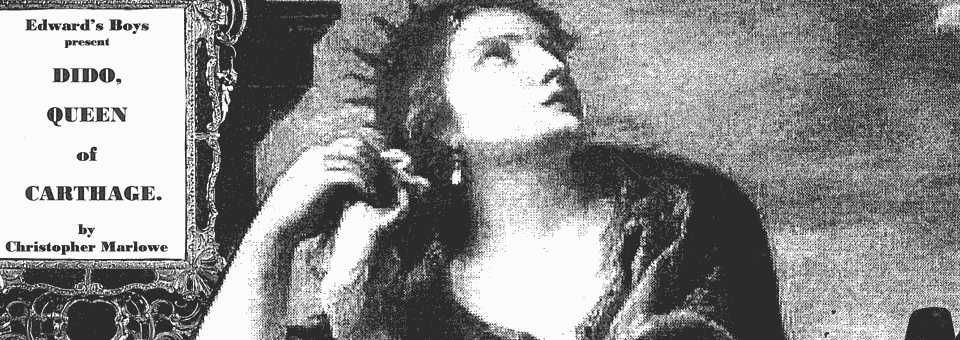
September 22, 2013, by Peter Kirwan
Dido, Queen of Carthage (Edward’s Boys) @ Christ Church Banqueting Hall, Oxford
Continuing the foregrounding of the identity of King Edward VI School that characterised Henry V, here a sporting motif suggested a combat that always lay beneath the overtures of peace. The play began with a whistle and Will Lindsay’s Jupiter emerged as a tracksuited PE teacher, picking up and playing with Nick Jones as Ganymede, wearing PE kit and playing with two bare-torsoed Action Men dolls. In interview after, Mills admitted that the boys had wanted to dress Jupiter in gold tracksuit and jewellery to make a clearer Jimmy Saville connection, but the school uniforms made the relationship already explicit enough.
The element of camp comedy in the gods made clear their ultimate irresponsibility, while also providing some beautiful moments of physical comedy. Hamish de Nett’s Juno, wearing angled glasses and enormous false breasts, shrieked in rage at Jupiter’s attentions to Ganymede, which fuelled her rage as, later, she threatened to kill the sleeping Ascanius. She and Venus (David Fairbairn in backless dress and a very tight bra) faced off against one another in a dramatic and portentous standoff, and the tiny Pascal Vogiaridis was a bare-chested Hermes who Jupiter picked up by the shorts and bodily threw (lightly) from the stage to deliver his message.
On the ground, the play’s rapidly shifting emotional states were driven by the wonderfully cheeky Joe Pocknell as Cupid, who posed in the iconic statue position of Cupid and puppeteered the helpless Dido and James Wilkinson’s Nurse with an expression of constant glee. Whether forcing Dido to mother him or teasing the Nurse who loved him (resulting in a quite shocking image as the lustful woman began forcing herself on a young boy laughing in delight), Cupid epitomised the irresponsible actions that led to destruction. Jupiter, Ganymede and (later) Venus remained onstage throughout, the older gods watching impassively while Ganymede wept for the suffering.
Daniel Wilkinson had a wonderful range of expression as a Dido concerned for her own position but susceptible to the charms of the child Ascanius. She dominated the main stage while Iarbus (Finlay Hatch) remained at the edges of the hall, their conversations being carried out shouting over the heads of diners. In one bravura sequence, Iarbus was banished from the hall by a Dido being forced to undergo lightning-fast emotional shifts created by Cupid’s sweeping hand movements. Her relationship with Aeneas was accompanied by beautiful singing from the choirboys, and by two swing singers who serenaded the room.
Aeneas was an upright leader and conflicted in his love for Dido. Tellingly, the appearance of Hermes carried with it the weight of a prostrate Jupiter shaking and screaming ‘Italy!’, applying terrifying pressure to Aeneas. The time spent on his long description of the Trojan wars (illustrated by Ganymede acting it out with his dolls) aligned him with the military aspect of his activity, and while his love for Dido was not feigned, his trajectory was never unclear, made the more obvious by the overt manipulation of Dido.
Pared down to about 90 minutes, the play did less in terms of individualising the Trojans but retained the prominence of the Anna storyline, acting as a sober and moving parallel to Dido. With Iarbus kept angrily at the edges of the hall, George Hodson’s plainly dressed Anna was reduced to crying after her love while standing alongside her more frantic sister. This was by no means a comic subplot, but in many ways the more affecting of the two love stories. Relief was provided by the lustful Nurse.
While the actors made significant reference to their surroundings, both treating the diners in the audience as Dido’s courtiers and referring to the portraits on the wall, the banquet scene was the only one which felt specifically designed for this kind of space. Rather, the length of the hall was used to set up emblematic images. The cave for Dido and Aeneas’ tryst was established by young boys sitting on the shoulders of taller actors and creating an arch for the lovers to disappear into. This was mirrored at the far end of the hall when a similar grouping of actors appeared wearing black shifts that flickered with red bulbs, creating a representation of the pyre, through an arch in which the three suicides walked.
The ominous feelings of the play created by the elegiac music that accompanied it were realised as Dido, Iarbus and Anna disappeared off down the grand stairs outside the banqueting hall, and were followed by the rest of the company, singing a lilting folk elegy for Dido. Wonderfully, the cast kept walking, their voices echoing back up the stone staircase and becoming gradually silent, leaving the audience simultaneously devastated and delighted. It was a fittingly large-scale close to a play that thrived on the oscillation between the intimate and the epic, and which filled a difficult space with ease.
No comments yet, fill out a comment to be the first

Leave a Reply